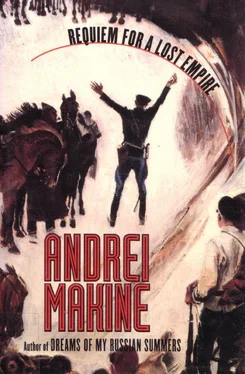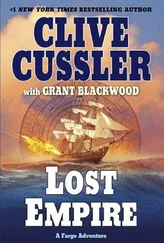Pavel encountered just such a soldier late in the day in the suburbs of Berlin, where their company was floundering about among little pockets of resistance. The red flag was already flying over the Reichstag, the victory had been announced, but there, behind a church with a dome shattered by shelling, there were still several concealed snipers who refused to give themselves up. There was one in particular, his face blackened by smoke, who was riddling the street from a hiding place behind a pillar eroded by bullets. He seemed invulnerable. After each burst of gunfire, as the dust cleared, you could see his stiff profile visible behind the column and the shooting started again. The young soldiers, perplexed, shrugged their shoulders, took careful aim, or, on the contrary, began spraying the whole façade, their faces contorted with rage. They finally took him out with a grenade launcher. Drawing closer, Pavel grasped their mistake at the same time as the others did, and whistled in astonishment. In a niche between two pillars stood a bronze statue crammed with their bullets. The German's hiding place had been close by, lower down. He lay there, dead, his face turned toward them. His left hand, covered in blood, was made fast to the butt of the machine gun by a length of wire. This had taken the place of smashed ligaments, so that he could continue firing. Browned with the soot of fires and the dust, his face closely resembled the metal of the statue. His features were expressionless.
This shooting had taken place while around the Reichstag victory was being celebrated. They arrived too late and Pavel did not even have time to write his name on the mutilated walls. The order to board the trucks had already been given and he had failed to find a piece of plaster on the ground strewn with cartridges and shrapnel. His greatest regret was not having written Marelst's name there, as he had for so long promised himself he would.
He felt there was something incomplete about those days of victory. The inscription not written… No, much more than that. The war was over, he thought, and the very idea seemed strange. From one day to the next all that tide of faces, dead or alive, of bodies unscathed or massacred, of cries, of tears, of dying breaths, all that was located in the past now, relegated to the past by the joy of the May sunshine in Berlin. Without being able to say as much, Pavel was waiting for a sign, a change in the color of the sky, in the smell of the air. But the weeks flowed by, confident of their newly established routine rhythm. The trucks arrived at the station. The trains filled with soldiers and traveled slowly back toward the east.
One day at dawn, already in Russia, while the train was stopped beside a village, Pavel saw a young woman rinsing bed linen, squatting at the edge of a stream. The strangeness of that calm morning bordered on madness. In Pavel's understanding, without his being able to put it into words, it was impossible, after all that had happened in the war, for anyone to be kneeling there calmly on the bank at this time, making those pieces of white cloth undulate in the water. It was impossible to have those legs, those thighs. That body made for love ought not to exist. She should have arisen, looked at him and shouted for joy, or wept and fallen back to earth. He shook his head, got a grip on himself. The soldiers around him were asleep. He sensed his face trembling in a grimace of jealousy The girl stood up, grasped the handle of the pail filled with the laundry she had just wrung out. He followed her movements, desired her, and, despite the violent joy that filled him, felt as if he were betraying someone.
They crossed Moscow at nightfall in trucks, from one station to another. Pavel did not know the city and was unconsciously expecting that the street speeding past the open back of the van would teach him about the mystery of this life without war. As they waited for a red light at a crossroads he saw the open window of a restaurant, the kitchen end. It was a heavy July evening. Painstakingly, a cook was carrying a vast saucepan, his body leaning backward, his mouth tensed with the effort. It was strange to think of a life in which this great cooking pot and its contents were important. At the far end of the kitchen a door opened and, as the truck carried them away, Pavel had time to see, moving past him, the dining room of the restaurant, the cluster of lights on the chandelier, a woman leaning over her plate, a man shaking his hand to extinguish a match. "They're having dinner," thought Pavel, and this activity seemed quite disconcertingly strange. At the station, while awaiting the departure of the long train composed of freight cars on which they were to be made to embark, he overheard the parting words of a couple saying their good-byes beside a suburban train, "Tomorrow, then, about seven." He made a face and shook his head, as if to rid himself of a fit of giddiness. This rendezvous at seven o'clock was located in a time, in a life, in a world that he could never enter.
He was still living in the days when after a battle the soldiers would pace numbly up and down among the dead, getting used to being alive. It was from those days that he had his knife with the notches on it, left by a soldier from a penal company. Back in those days there was the soldier who, before crumpling up, had fingered the emptiness in the place where his jaw had been torn off. That night a cry woke him. "The tanks! Over there on the right!" yelled his neighbor, wrestling with a nightmare. There were several sniggers, several sighs in the darkness, then once again silence and the drumming of the rails.
He was sure, now, that in Dolshanka he would find a new life, even one in which he could forget. In the district capital, before setting out on the road, he saw a woman gathering raspberries behind her garden fence. The house opposite had had the roof blown off by an explosion and seemed uninhabited. He observed the woman's hands, strangely delicate and white, her fingers stained with purple juice. Her forearms were full, unbearable to look at. He gave a little cough, approached with a hesitant step, leaned on the fence with aggressive casualness and asked the way to Dolshanka. "What's that you say, Dolshanka?" said the woman, amazed, and shrugged her shoulders. In her tone of voice there was both flattered curiosity at speaking to a soldier and a desire to flaunt her pride. Pavel walked away, then turned back, thinking: "What a cow! Why not grab her, snatch her basket, rape her?" But one part of him, a very gentle part, was already crumbling, melting warmly and touching his heart, including in the happiness of that morning both the woman with her red-stained fingers and the old wooden fence as it began to grow warm under the still-pale rays of the sun.
As he walked along he thought about his return to Dolshanka, a return so often pictured that now the desire seized him to steal in quietly, passing through kitchen gardens, to avoid people's stares, their greetings. Unconsciously, he was transporting to Dolshanka all the people he had encountered on the return journey, in Moscow, in the district capital. He pictured the village filled with this war-free vitality, a happiness that was already routine, confident of its rights. There would be the bustle of young people in the main street, the long-drawn-out strains, at once merry and plaintive, of the accordion, crowds gathering, questions, a multitude of unknown children. And in order to be able to bear this agonizing gaiety he would need to down a good glass of vodka, then another.
Not to go back at all? The idea suddenly struck him as plausible and it was at that very moment he noticed that the road, a road of which he knew every twist and turn, had changed. It was not the line of burned-out trucks outside the district capital, nor the shell craters that gave this impression. Quite simply, the earth road was disappearing here and there under the advance of the forest. Young wild cherry trees were growing in the middle of it, grass filled the ruts. He found himself catching his boot against the cap of a fly agaric fungus, walking around an anthill. But the major landmarks were still there: the oak grove that plunged down into a ravine, a large chalky mound surrounded by fir trees. Pavel bent down, touched the layer of sand and pine needles. It was formed into a solid crust, all interwoven with stems and roots. Continuing on his way he unconsciously accelerated his pace.
Читать дальше










